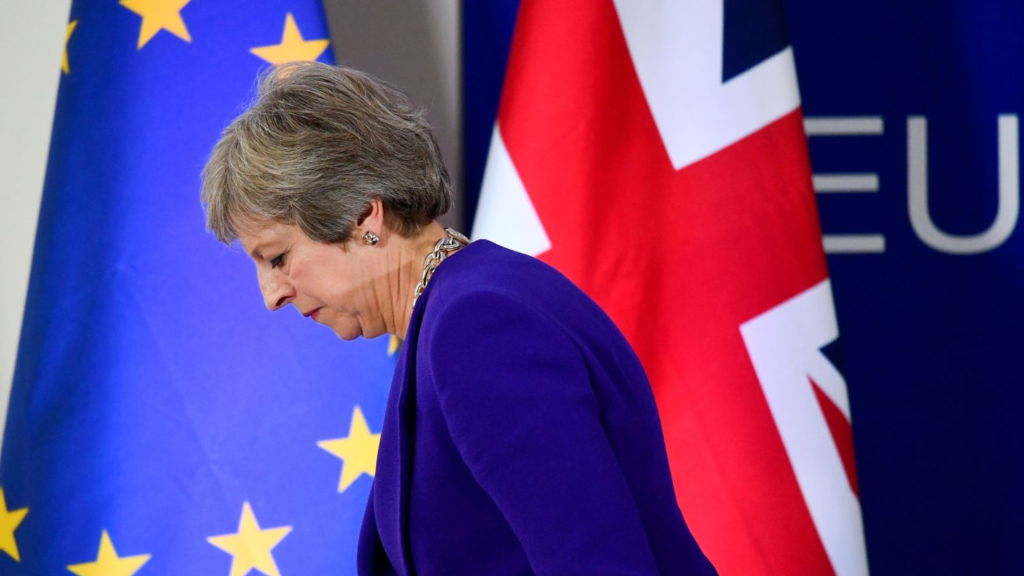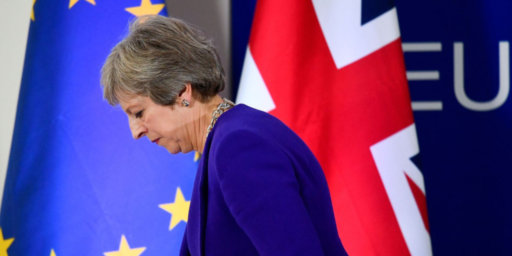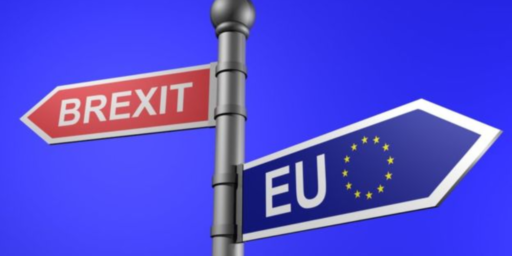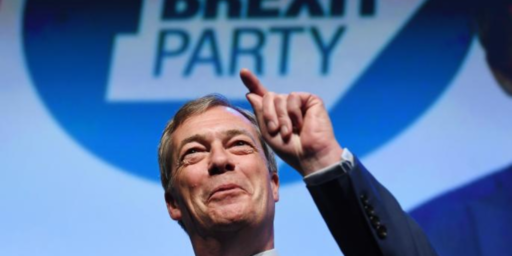Time for Theresa May to Go?
Many are calling for the UK Prime Minister's ouster. But the problem is Brexit itself, not any one leader.

Reuters (“‘Time’s up, Theresa’? May battles to keep control of Brexit“):
Prime Minister Theresa May battled on Monday to keep control of Britain’s exit from the European Union as some in her party called on her to quit and parliament plotted to wrest Brexit away from the government.
At one of the most important junctures for the country in at least a generation, British politics was at fever pitch and, nearly three years since the 2016 EU membership referendum, it was still unclear how, when or if Brexit will take place.
With May humiliated and weakened, ministers lined up to insist she was still in charge and to deny any part in, or knowledge of, a reported plot to demand she name a date to leave office at a cabinet meeting which started at 1000 GMT on Monday.
“Time’s up, Theresa,” Rupert Murdoch’s The Sun newspaper said in a front page editorial. It said her one chance of getting her Brexit deal approved by parliament was to name a date for her departure.
Some lawmakers publicly called for May to go.
“I hope that the cabinet will tell the prime minister the game is up,” Andrew Bridgen, a Conservative lawmaker who supports Brexit, told Sky News.
“The prime minister does not have the confidence of the parliamentary party. She clearly doesn’t have the confidence of the cabinet and she certainly doesn’t have the confidence of our members out there in the country,” he said.
Days before the original exit date of March 29, British ministers and lawmakers were still publicly discussing an array of options including leaving with May’s deal, with no deal, revoking the Article 50 divorce papers, calling another referendum or going for a closer relationship with the EU.
May had to delay that departure date due to the political deadlock in London. Now Britain will leave on May 22 if her deal is approved by parliament. If not, Britain will have until April 12 to offer a new plan or decide to leave without a treaty.
The EU believes a no-deal Brexit is increasingly likely, EU officials said.
May’s inability to get Parliament to agree to a Brexit deal has made her and her country a laughingstock. But it’s not obvious who could have done a better job or who could salvage the situation going forward.
The real problem, of course, stemmed from the feckless decision of May’s predecessor, David Cameron, to offer up a Leave/Remain referendum [see Steven Taylor’s October 2016 “On Referenda” for why this was a bad idea] as a concession for keeping power. Cameron bet the farm that the campaign would demonstrate that the pain of leaving the EU would far outweigh the benefits. He lost. Quite rightly, after that monumental failure of leadership, he resigned his post.
May was a compromise candidate to clean up Cameron’s mess. A Brexit skeptic, she nonetheless adopted a hard line “Brexit Means Brexit!” stance in order to shore up her base of support amongst the Tory MPs and has stubbornly clung to that despite all evidence that the voters not only had no idea what they were voting on and the very likely possibility that the outcome was skewed by foreign interference.
EU leaders played hardball with May, refusing (against my advice) to give Britain a face-saving way to keep most of the way in the EU while ostensibly leaving. May had zero leverage and ultimately signed a not-very-good deal. Parliament has voted down every option May has presented without giving her the option to say “Never mind” and withdraw the withdrawal notice. Along the way, May even called for new elections, which perversely kept her in power and yet thinned out her majority.
It’s an amazing failure of vision and leadership all around. Yet, if Parliament insists on Brexit and refuses to vote for any deal, there’s no option but the sheer disaster of the No Deal Brexit. And if those facts don’t change, neither May nor any conceivable leader—including the ghost of Winston Churchill—can avoid the inevitable.
My former boss at the Atlantic Council, Fred Kempe, renewed his call to “Reverse Brexit, Save Britain!” over the weekend.
Perhaps the best one can hope for this coming week in the United Kingdom, in light of a slightly extended Brexit deadline to April 12, is something akin to a failed suicide. As is sometimes the case after narrowly escaped tragedy, the potential victim draws meaning from the exhilaration of unexpected survival.
Perhaps, by some miracle in the coming days, wiser heads in the UK government and parliament can construct a longer Brexit extension for a year or more that would allow a period of national reflection, resulting possibly in a new general election or even a second referendum, a so-called “people’s vote,” on whether to leave the European Union under now-known terms.
Perhaps, British legislators will see this reexamination as the only alternative, having soundly rejected Prime Minister Theresa May’s Brexit plan twice – an agreement the EU has insisted it won’t renegotiate. They voted as well against the only other outcome on offer: a hard, no-deal Brexit with all its devastating economic consequences.
The process of elimination would seem to leave only one logical way forward.
So perhaps it is not too late for one of the world’s great parliamentary democracies to come to its senses and concede that the country knows now what was unclear at the time of the June 2016 referendum: the United Kingdom will be economically poorer and politically less influential under any Brexit plan. The run-up alone by one estimate is costing the British economy 40 billion pounds annually and 2 percent of GDP.
Perhaps even Brexit advocates will have learned that their argument that leaving the EU would allow British citizens to “take back control” of their country was always a false premise. Nothing could have made that clearer than the huddle of 27 European leaders this week, laying down the final terms dictating when exactly the British people will leave the EU and under which circumstances.
And, perhaps even the most frustrated and angry Eurocrats in Brussels will remind themselves that both Europe and the UK will be less if the current suicidal course isn’t replaced by urgent intervention and reconsideration.
Perhaps, just perhaps, by next week pigs will fly.
There’s much more at the link but he’s right, both on the obvious choice and the incredible unlikelihood of it being made.






Just this once, May should abandon her democratic principles and deign to let the people vote.
@Kit: I think she should have done that months ago. At this juncture, though, I don’t know how she does that by the EU deadline—unless they give her another extension.
The problem afflicting the U.K. is that the populace is split almost 50%-50% between those who want to remain in the EU and those who want to go it alone. Both the Tory and Labour parties are individually split as well, which is why neither party is moving that much (and Jeremy Corbyn remains a fence-sitter.)
Britain doesn’t know what it wants to do. Hence the running around in circles for the last two years. We’re at the point where the rest of the EU has gotten totally fed up with waiting for Britain to make up what passes for its mind and has decided “might as well kick the idiots out.” Everyone agrees that there will be difficulties with a no-deal Brexit, but they’ve gotten tired of British angst and dithering.
The Brexiters assume that the U.K. is still a top power player in the world, has a large economy, and can bluff whatever it wants out of anyone it is trying to negotiate with. Mistake. The EU doesn’t work by bluffing (nor do a lot of Asian countries).
If there is one piece of advice I would give the Brits, it is this: you’re not as important as you think you are to the rest of the world. German car manufacturers aren’t going to rush to your rescue. Neither is the US. Settle down, stop insulting everyone else, and quietly look for an area of expertise you can specialise in as a totally independent country–because you’re certainly not going to be included in any multi-national JIT manufacturing chains in the future. Oh, and don’t expect the Japanese to save you, either. You’ve gone back on your promises to them and they’re pretty annoyed. And get rid of all those idiots from Eton who think that arrogance and a knowledge of Latin is sufficient education to run the country.
@grumpy realist:
I think that’s right. But, as the last two-plus years have demonstrated, “Leave” isn’t actually a single position. Leave under what circumstances? And are those circumstances obtainable? My suggestion early on was that the EU should give the UK a Norway deal. While I understand why they don’t want to establish that precedent, it would have been far better for all parties than the likely No Deal Brexit.
Also correct.
Brexit has always really been about wealthy brits wanting to avoid having to comply with the EU anti-tax avoidance directive, and a hard brexit has thus always been their goal. May’s actions make far more sense if you look at them as someone trying to trigger a no-deal brexit without having to explicitly advocate for one, so that they can then blame the fallout on others.
To wit, the current plan is to keep doing nothing until the EU gets tired of it and refuses to grant an extension and then blame them from everything that happens.
@James Joyner:
The EU was never going to give the UK the Norway deal, it would have been the end of the EU as other countries that are unhappy for whatever reason, real or imagined would have followed. A country get the benefits of the economic union but not the responsibilities or limitations on nationalism, what country wouldn’t take that deal and leave?
The EU went into this negotiation with the intent on making it as painful for the UK as possible in order to make them an example.
@Sleeping Dog: I think that’s right. But I also think the Leave’rs had a point. It’s been my longstanding view that the EU project—the move from a Common Market to something like a European Confederation—was rammed through undemocratically. And that the matter was made worse by expanding membership at the same time, such that it included countries who had no business being in on a single currency.
As someone who spends a lot of time in the UK, and who lived there for two years, it’s pretty simple to me. Brexit is the UK version of Trump.
Let me try to unpack that. Like the Trump election here in the USA, Brexit was, to too many Brits, a middle finger at the establishment and nothing more. Like the Trump election here in the USA, Brexit was passed under wholly unnatural circumstances with Russian and others meddling in the election and passing misinformation as truth. Many of the same players involved with funding the Trump campaign (Mercers, I’m looking at you). funded Brexit. At it’s core, most of the “Leave” people are the same group that look at the UK the same way Trump supporters view the USA. They see their country being changed by “the other”, and they want to stop it. But, that’s never going to happen. Britain isn’t an Empire any longer.
Small town America is never coming back the way it was. The Britain of 40 years ago isn’t either.
Every one of my friends in London voted “Remain”. But, then again, they’re smart, educated, and understand the global world in which we all now live.
@Stormy Dragon: As plans go, it’s not that bad, even though it is self-serving. The problem is that “rich” and “invulnerable” have never been synonyms, even though the wealthy keep believing they are.
@James Joyner: That’s why the original vote was so ridiculous. “Leave” vs. “Remain”, when “Leave” wasn’t defined. A lot of the commentators over at the Telegraph are now insisting that “Leave” obviously meant “a clean Brexit” out of the EU with no participation whatsoever, regardless of all the claims made by Brexiteers before the referendum. That’s now getting wrapped up in the argument for “no-deal Brexit” since it’s only on crashing out that the required purity of Brexit will be achieved.
“the Norway option” would have been possible if the U.K. had originally targeted that as the end goal and had worked with humility to come to a compromise on any sticky details. As it is, the Brits have made it obvious that they would be using a Norway option only as a temporary position before leaving all together. And second–the other EEA members aren’t very interested in allowing a much larger economy in that’s going to attempt to bully everyone else in the club and keep needling the EU.
So the U.K. is now in the situation where it has ticked off everyone that it is going to try to get FTAs with, has irritated the rest of the EU considerably, and is still whining about how everyone is so MEEEAN to them.
They deserve all the problems a hard crashing out from the EU will cause them.
A few years back there was this idea floating around that Anglo-Saxons were particularly good at government. Then came Brexit and Trump and now the Anglo-Saxon fans are left to look to New Zealand.
Both events are reminders that ‘we’ ain’t so special. We do not have the magic keys to the kingdom of good and stable government.
Ahh, so just like in our country, there are a lot of problems because greedy rich people want to keep as much of their wealth as possible…
@James Joyner: The EU have offered a Norway deal. It has offered an extensive menu to choose from actually, best illustrated by the famous slide Barnier showed about the options the UK can choose from and what legal consequences each choice has.
But the UK can’t make up their mind. They want frictionless trade yet the ability to diverge via trade deals, they want full access to the SM but not the 4 freedoms (mainly Freedom of movement), they want security opt-ins on things they had opt-outs of as a member of the EU, they want participation in things that they previously made sure where not available to third countries (i.e. they made sure the Swiss didn’t have full access to Galileo), they want to participate in the European arrest warrants but not accept the jurisdiction of the ECJ, etc.
The more divergence, the less access, which seems logical enough. The Norway+ option (either in Efta of in a separate associate agreement) is not possible due to the red lines the UK has drawn, not because the EU didn’t want it.
@James Joyner:
I can’t dispute that. My knowledge of formation of the economic union and the expansion into what is the EU today is fairly sparse. In general, I do believe though, that the formation of the EU as we know it was a good idea because there is no way that even the largest of the European states would have been competitive economically without banding together.
The UK government should declare itself incompetent in the matter of Brexit and hire a team of consultants to run that part of government.
I feel a series idea. Dark comedy about an international team of bureaucrats assigned to take over failing governments. Iannucci has to write it, no doubt about that. The B-Team. The League of Extraordinary Suits. The Pinstripe Avengers. There’s no need to fear, double-entry bookkeeping is here! Who you gonna call? Slothbusters!
@Michael Reynolds:
Oh! That would have been a hell of Futurama episode, with Hermes Conrad, Bureaucrat, in charge of the operation. Or better yet, with Bureaucrat 1.0 in charge.
“Don’t quote me the regulations! I co-chaired the committee that reviewed the recommendation to revise the color of the book that regulation’s in.”
Sometimes I think Theresa May wished upon a monkey’s paw to be Prime Minister. Possibly at the expense of her soul.
She can’t give it up after all she paid for it, but it’s just so much worse than it never having happened.
If she’s very lucky, they will push her out, and she can retire somewhere.
@Dutchmarbel:
Well, there’s also the small problem that at least one of the EFTA member doesn’t want the UK to join EFTA. And they all have the right to veto new members.
@Stormy Dragon: Thank you. Brexit has been a mystery to me. Why does anyone want it? The Leave voters obviously are an emotional stew of xenophobia and nostalgia and shell shock from the great recession, like Trump voters. But as with Trump’s populism, who is spending the many millions to keep these voters stoked and why? Yours is the first explanatory theory I’ve seen.
I Googled looking for support. I was looking for something not from an advocacy group or specialized financial press but from a trustworthy major source. But I found nothing from NYT or WAPO or such. This was the best I could find. In the absence of any other credible theory, I’ll have to accept this as a working theory. May’s selling her country down the Thames to support the Mercers’ et al tax evasion.
@gVOR08: Well, there’s always been a streak of Euro-scepticism in the U.K. I think that the vote was originally a kick in the teeth from those ticked off by the incessant austerity of the Tories, the “do what we tell you because it’s good for you” attitude of too many politicians (on both EU and UK sides), immigration, and whatever else. Since very few people knew exactly what membership in the EU meant or how it streamlined regulations and business, no one cared. So the Brits voted out in a sense of pique…..and then the ball was grabbed by the disaster capitalists/income tax evaders who ran off with it.
I’m quite sure they’ve got all their forks and knives ready for carving up the good bits of the U.K. economy and grabbing the opportunity while the rest of the great unwashed are distracted by stabbed-in-the-back-by-Remainer-traitor stories and continue to throw mud at each other. The rich will make out like bandits, like usual. As it goes.
The one bright side is that I now know what a “three-line whip” is.
Jura data point. I was in meeting yesterday and two Brits had flown in from England. During a break they both went over to some online petition and signed on to cancel Brexit. The tally was at well over 5 mllion
@PJ: EXACTLY. The past two years have shown that Britain, or entrenched interests in the Tory Pary who are more concerned with wealth than governance, do not play well with others and cannot be trusted. They will never – especially after this fiasco – be admitted to the EFTA table.
One of the saddest parts to me is after they were dragged kicking & screaming into the EU, now they’re going to dive headfirst out of it into a dry swimming pool, and the EU nations are so fed up they’re probably going to push them off the diving board because, sheesh, they’ve had two frickin’ years to get their s**t together.
@gVOR08:
It also helps if you’re aware that Theresa May’s husband is Philip May, billionaire hedge fund manager.
@Stormy Dragon: I was aware of that, but only because you mentioned it earlier.
Piketty explains that wealth is increasing and that as it increases it will exercise more political clout. Doesn’t seem to be taking them very long.
@Stormy Dragon: I was aware of that, but only because you mentioned it earlier.
Piketty explains that wealth is increasing and that as it increases it will exercise more political clout. Doesn’t seem to be taking them very long.
@MarkedMan:
Stories I saw said hundreds of thousands, maybe a million, at the anti-Brexit march a day or two ago.
Not entirely true; May has only presented one option: her deal, and in crafting it has continually sought to placate the Brexiters.
Also, she has always retained the option of revocation; but would never use it because it would shatter the Conservative Party.
May is a Tory to her toenails, and wholly incapable of perceiving that the interests of Party and Country might not be identical.
Her whole strategy was misconceived from the outset, being party-centric and intent on wooing Labour Leaver votes to shore up the Conservatives, sharpening leave/remain antagonism rather than shaping a national consesnsus, and with three massive mistakes in particular:
1) Triggering Article 50 before forming a coherent strategy and a solid body of support
2) Setting out negotiation “red lines” that made negotiation more difficult, antagonised compromise inclined former Remainers (and quite a few “flexit” camp leavers), required EU to defend its vital interests, and bringing the issue of the Irish border centre stage.
3) Calling a general election in the clear hope of sweeping up most leave voters plus Conservative core plus anti-Corbyn. And failing miserably leaving her dependent on the DUP and vulnerable to the internal ERG faction.
And now the ERG, having sunk May’s deal, are themselves squabbling over switching to back it in fear that Parliament will fully seize control and rule out their preferred no-deal.
“Congratulations, fools; you played yourselves.”
May resigning would not resolve anything at this point.
It would (unless she resigned as PM but not as Con. leader …hah!) trigger a Con. leadership process; and as the Party at large has (like Labour) become increasingly dominated by mad activists a Brexit hardliner would almost certainly win.
(Boris Johnson would stand a v. good chance due purely to name recognition by the semi-senile, hence his frantic manoeuvring to avoid his suspicious fellow MP’s locking him out of the final two who get to the Party wide vote.)
Anyway, EU might well refuse further delay to indulge the Tories psychodramas.
It is now in the hands of Parliament: there is a majority in the House against No Deal; the majority must now decide, if they are determined to reject May’s deal.
If so, they will need to form a cross-Party alliance to decide on a CU or CU+SM solution, and accept that means respecting EU requirements re. budget contribution, free movement, regulation, EDJ jurisdiction etc. and force govt. to bend to Parlt.s will.
In effect, to replace the government with a caretaker cabinet or some sort of innovatory de facto committee of supervision (Constitutional crisis on acid!)
And pray the EU accepts (I’d say chance is still better than evens, going by what the have and haven’t said),
Or go for a second referendum; or revoke. Again, requiring forcing the govt. to obey.
And probably needing to force Corbyn aside, and likely split Labour as well.
At least if they choose to act, moderate MP’s can see there is a active body of mass support in the country:
Petition to revoke now at 5.77 million and still climbing.
The remain march certainly had attendance at least in the high six digits.
Or else their nerve fails, they back down, and must then grit their teeth, vote the May deal through, and hope to fix its worst bits in the trade talks.
The next few days in Parliament are likely the most historically momentous since the Second World War at least.
@Blue Galangal: I see the situation a little differently in that to me it’s like parents and school reform. Parents want to want school reform, but they don’t want to have anything that will actually change the way school works.
Same think here–the UK wants to be able to look at a proposal to enter the EFTA so that they can say meeeeeeh… I’ll pass. Sadly, no one is going to bite.